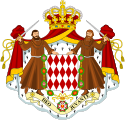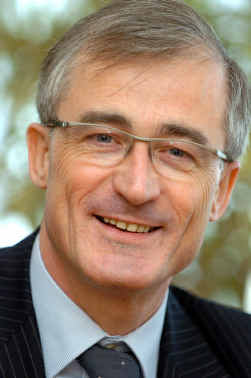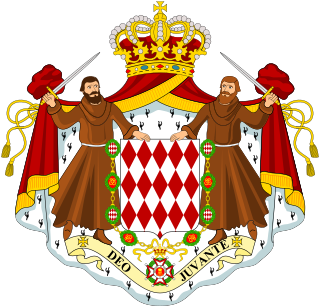 |
|---|
General elections were held in Monaco on 16 July 1933 to elect the 12 members of the National Council. [1] The national councilmen were elected by a 30-member Electoral College.
 |
|---|
General elections were held in Monaco on 16 July 1933 to elect the 12 members of the National Council. [1] The national councilmen were elected by a 30-member Electoral College.
The 30-member Electoral College consisted of nine members elected by the Communal Council and 21 members elected by voters. The Electoral College also includes three substitute members elected by the Communal Council and six substitute members elected by voters.
The Communal Council held an election for nine members and three substitute members of the Electoral College on 24 June 1933.
| Candidates | Votes | |
|---|---|---|
| Members | G. Sangiorgio | 13 |
| Louis Auréglia | 12 | |
| Pierre Jioffredy | 12 | |
| Jacques Reymond | 12 | |
| Paul Bergeaud | 12 | |
| Louis Bellaudo | 12 | |
| J.-B. Gastaud | 12 | |
| Charles Bernasconi | 12 | |
| Eugène Marquet | 12 | |
| Substitute members | Louis Settimo | 13 |
| Marcel Médecin | 12 | |
| Victor Rigazzi | 12 | |
| Voters | 13 | |
| Registered voters | 15 | |
| Source: [2] | ||
An election of the remaining 21 Electoral College members and six substitute members was held on 25 June 1933.
| Candidates | Votes | |
|---|---|---|
| Members | Louis Auréglia | 477 |
| Georges Jioffredy | 473 | |
| Henri Rapaire | 473 | |
| Jules Sangiorgio | 471 | |
| Joseph Boisson | 470 | |
| Eugène Marquet | 470 | |
| Auguste Médecin | 470 | |
| Henri Obvié | 470 | |
| Emmanuel Rué | 469 | |
| Jean Notari | 465 | |
| Henri Médecin | 463 | |
| François Fissore | 463 | |
| Emmanuel Caravel | 461 | |
| Joseph Berti | 459 | |
| Second Palmero | 459 | |
| Auguste Boin | 458 | |
| Louis Briano | 458 | |
| Jules Cerutti | 455 | |
| Laurent Campana | 454 | |
| Michel Porasso | 454 | |
| Parfait Sanmori | 449 | |
| Substitute members | Roger Abel | 466 |
| Antoine Gazo | 459 | |
| Albert Pistonatto | 459 | |
| Charles Kroenlein | 458 | |
| Emile Bianchi | 457 | |
| Antoine Icardi | 456 | |
| Valid ballots | 494 | |
| Invalid ballots | 5 | |
| Total ballots | 499 | |
| Registered voters | 823 | |
| Source: [2] | ||
| Candidate | Votes | ||
|---|---|---|---|
| Pierre Blanchy | 30 | ||
| Arthur Crovetto | 30 | ||
| Étienne Fautrier | 30 | ||
| Robert Marchisio | 30 | ||
| Eugène Marquet | 30 | ||
| Marcel Médecin | 30 | ||
| Henri Settimo | 30 | ||
| Louis Auréglia | 29 | ||
| Charles Bernasconi | 29 | ||
| Pierre Jioffredy | 29 | ||
| Jean Notari | 29 | ||
| Jacques Reymond | 29 | ||
| Voters | 30 | ||
| Registered voters | 30 | ||
| Source: [1] | |||

The National Assembly is the lower house of the bicameral French Parliament under the Fifth Republic, the upper house being the Senate. The National Assembly's legislators are known as députés, meaning "delegate" or "envoy" in English; etymologically, it is a cognate of the English word deputy, which is the standard term for legislators in many parliamentary systems).

Since becoming independent of the United Kingdom in 1970, Fiji has had four constitutions, and the voting system has changed accordingly.

Elections in Venezuela are held at a national level for the President of Venezuela as head of state and head of government, and for a unicameral legislature. The President of Venezuela is elected for a six-year term by direct election plurality voting, and is eligible for re-election. The National Assembly (Asamblea Nacional) has 165 members (diputados), elected for five-year terms using a mixed-member majoritarian representation system. Elections also take place at state level and local level.

Elections in Botswana take place within the framework of a multi-party democracy and a parliamentary system. The National Assembly is mostly directly elected, and in turn elects the President and some of its own members. The Ntlo ya Dikgosi is a mixture of appointed, hereditary and indirectly elected members.

Elections in Gabon take place within the framework of a presidential multi-party democracy with the Gabonese Democratic Party, in power since independence, as the dominant party. The President and National Assembly are directly elected, whilst the Senate is indirectly elected.
Elections in Luxembourg are held to determine the political composition of the representative institutions of the Grand Duchy of Luxembourg. Luxembourg is a liberal representative democracy, with universal suffrage guaranteed under its constitution. Elections are held regularly, and are considered to be fair and free.

Elections in Togo take place within the framework of a presidential system. Both the President and the National Assembly are directly elected by voters. Togo is a one party dominant state with the Union for the Republic in power.

National constituencies were a former feature of the Fijian electoral system. They were created as a compromise between demands for universal suffrage on a common voters' roll, and for a strictly communal franchise, with Parliamentary constituencies allocated on an ethnic basis and elected only by voters enrolled as members of specific ethnic groups.

Limete is one of the 24 communes that are the administrative divisions of Kinshasa, the capital city of the Democratic Republic of the Congo.

Matete is one of the 24 communes that are the administrative divisions of Kinshasa, the capital city of the Democratic Republic of the Congo.

Senators in France are elected by indirect universal suffrage, by a panel of "electors". Half of the Senate seats are up for election every three years; the term of office is six years.
The electoral system of Turkey varies for general, presidential and local elections that take place in Turkey every five years. Turkey has been a multi-party democracy since 1950, with the first democratic election held on 14 May 1950 leading to the end of the single-party rule established in 1923. The current electoral system for electing Members of Parliament to the Grand National Assembly has a 7% election threshold.
Parliamentary elections were held in the United Arab Emirates on 3 October 2015 to elect 20 of the 40 members of the Federal National Council. The elections took place through an electoral college, which was expanded from 129,274 members in the 2011 elections to 224,279 for the 2015 elections.

An election was held on 26 May 2019 in the three Belgian constituencies to elect the Belgian delegation to the European Parliament. It was part of the 2019 European Parliament election.

General elections were held in Monaco on 19 May 1918 to elect the 12 members of the National Council. The national councilmen were elected by a 30-member Electoral College.

General election were held in Monaco on 16 June 1929 to elect the 12 members of the National Council. The national councilmen were elected by a 30-member Electoral College.

General election were held in Monaco on 8 May 1921 to elect five members of the National Council. The national councilmen were elected by a 30-member Electoral College.

General election were held in Monaco on 21 May 1922 to elect 12 members of the National Council. The national councilmen were elected by a 30-member Electoral College.

General election were held in Monaco on 18 April 1926 to elect 12 members of the National Council. The national councilmen were elected by a 30-member Electoral College.

General election were held in Monaco on 4 July 1937 to elect five members of the National Council. The national councilmen were elected by a 30-member Electoral College.